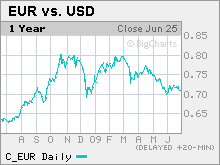Dollar rises on oil and stock gains
European data also spark recovery hopes.
LONDON (Reuters) -- The dollar and euro climbed against the yen Monday, as gains in oil prices and U.S. stocks along with better-than-expected sentiment in Europe rekindled hopes of a global economic recovery.
That encouraged investors to sell the yen, viewed as a safe haven along with the dollar, and wade into other higher-yielding assets.
Comments from China, the single biggest holder of U.S. Treasury securities, ruling out sudden changes in its foreign exchange reserve policy bolstered the dollar against the yen earlier in the day.
But currency traders switched their focus to the surge in crude oil prices and rising equities in the afternoon.
"Commodities are really the big story of the day. We've had the Nigerian oilfield attack, which has seen oil spike and that has really driven up the stock market," said Dan Cook, market analyst at IG Markets in Chicago.
"With stocks up, investors are selling the dollar against the euro especially. The yen is also down sharply with equities trading higher," he said.
Oil prices rose over 3% Monday, lifted by word of fresh rebel attacks on oil installations in key African producer, Nigeria, as well as gains in equity markets.
Nigeria's main militant group said its fighters had attacked an oil facility belonging to Royal Dutch Shell in the Niger Delta on Monday, days after President Umaru Yar'Adua proposed an amnesty.
In late afternoon trading, the euro rose 0.2% against the dollar to $1.4078. The European currency also gained support earlier after data showed euro zone economic sentiment improved more than expected in June.
A survey by the European Commission showed economic sentiment in 16 countries using the euro rose to 73.3 points in June from 70.2 points in May.
The dollar was up 0.8% against the yen at 96.02. The euro also gained against the yen, rising 0.9% to 135.16.
The New Zealand dollar rose 0.7% against the greenback to US$0.6502, while the Australian dollar was up slightly at US$0.8081.
The earlier China news also was a positive factor for the dollar as Chinese officials said at a meeting of central bankers in Basel at the weekend that the policy governing its currency reserves was stable and consistent with no "sudden changes."
Some analysts, however, were not buying China's comments.
"I don't really believe in what China said (earlier). I don't think their politics are in line with their best interests," said Melvin Harris, currency strategist, at Advanced Currency Markets in New York. "China has way too much dollar debt. They're going to have to diversify in order to manage risk successfully."
The dollar had come under pressure recently as debate intensified about the use of an alternative global currency to the greenback.
Overall, analysts said currency movements would remain subdued ahead of U.S. non-farm payrolls data for June and comments later this week by the European Central Bank and Sweden's Riksbank after their respective monetary policy meetings.
"Euro/dollar has been stuck in a range between $1.3890 and $1.42 for some time," said George Davis, chief technical analyst at RBC Capital in Toronto. "We would need real market-moving news to see the pair breaking out of that pattern."
The market will particularly pay close attention to U.S. jobs data for any sign of improvement in the economy's health.
The report is due on Thursday, with U.S. financial markets closed on Friday for the Independence Day holiday. A Reuters poll showed economists expect job losses of 363,000 in June. ![]()



